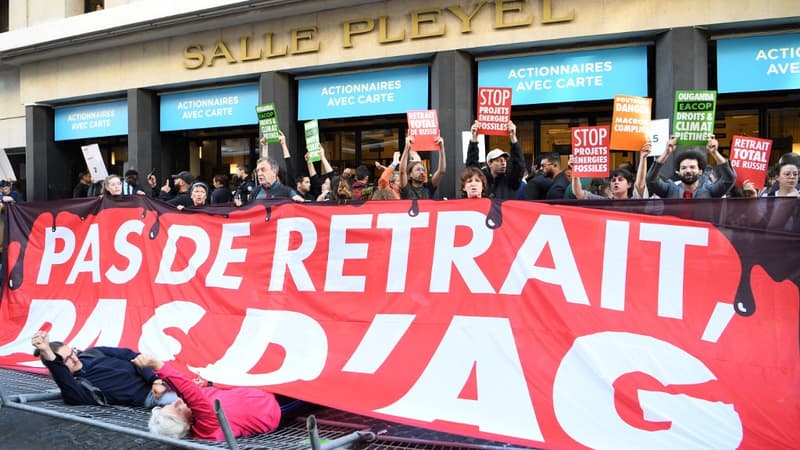The climate is invited to general meetings of large companies, oil and gas companies in the foreground. On Tuesday, Shell’s AGM was disrupted by dozens of climate activists who interrupted the president’s speech by chanting “Go to hell, Shell!” And during the one held by BP last April, some shareholders protested against the decision of the British group to stop its energy transition.
Which gives cold sweats to the French giant TotalÉnergies, which celebrates its AG this Friday. Investors had already publicly opposed his climate strategy last year.
The general assemblies of other companies, accused of financing polluting activities, have also been disturbed, in particular of the big banks, such as HSBC, Barclays or BNP Paribas.
Abortion inflames the US General Assemblies
In the United States, beyond the star theme of the climate, other political and social issues are also invited, which makes the GAs true forums for social debate. Some militant shareholder groups are inspired by activist funds, such as TCI for example, to hold companies accountable for their position on certain issues.
Abortion, for example, has become a real problem in certain US states that recently banned it. Several groups of activists have unpacked the issue during the general meetings of the pharmaceutical group Eli Lilly, American Express or even Alphabet, the parent company of Google, calling on each company to take a clear position on the issue of abortion.
The same goes for gun laws: Mastercard has come under pressure from a group of shareholders trying to get a better track on Atlantic firearms transactions.
“Say About the Weather”
Social issues are less present in Europe, where the issue of environmental, social and governance (ESG) criteria within companies “is already very advanced”, underlines Jehanne Leroy, director of ESG research at Proxinvest, on the set of BFM business.
Say-on-the-weather resolutions are inspired by the age-old “say-on-the-pay” principle of executive compensation. The climate issue “is very interesting for investors”, who “encourage companies to communicate on this issue in a much broader way”, says Jehanne Leroy.
Behind the noise, often rejected resolutions
But, until now, most resolutions on climate issues have been rejected by general meetings, since the shareholder groups that carry these resolutions do not carry enough weight. “It is not a specificity” linked to the climate issue”, explains Jehanne Leroy.
Latest example at the McDonald’s General Shareholders’ Meeting on Thursday. The fast-food king came under fire from one of its shareholders, the French asset manager Amundi, which proposed a resolution aimed at cutting back on purchases of meat stuffed with antibiotics. According to her, the meats that McDonald’s buys contain certain antibiotics considered dangerous that could lead the world population to develop resistance to these products and reduce our ability to treat diseases.
A threat to health that also poses an economic threat to the company and it is with this argument that Amundi hoped to rally the majority of shareholders to his cause to vote in favor of his resolution.
Source: BFM TV


